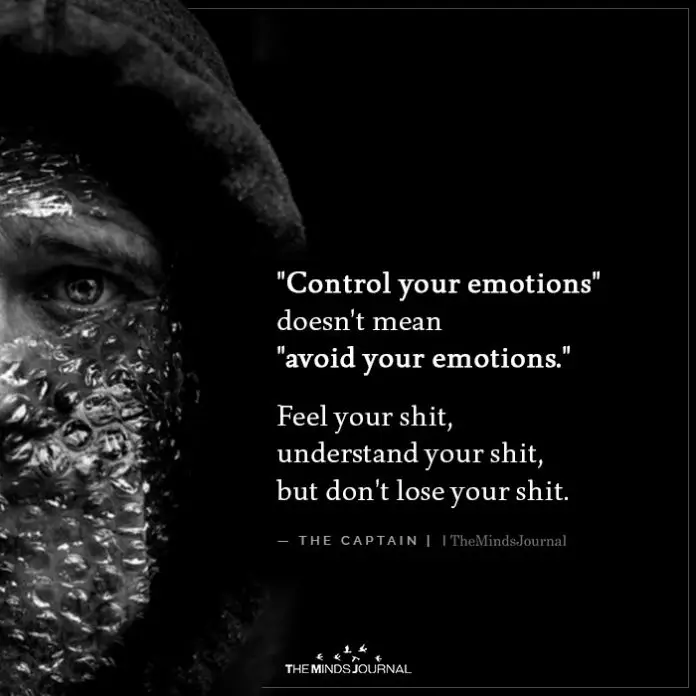Emotion regulation is defined as the ability to affect one’s own emotional state. Learning strategies to regulate your emotions leads you to live a more emotionally balanced life. But regulating our ever-fluctuating emotions is not as easy as it may seem.
Are you struggling with yourself emotionally, and trying very hard to regulate your emotions?
Emotions are the drivers for human action. They shape your experience as a human being. They can take you to the heights of pleasure and to the depths of despair.
Life without emotion is unimaginable—but what about life with uncontrolled emotion? Mental health professionals call this emotional dysregulation, which is feeling like your emotions are scattered, in constant flux, outside your control, and unmanageable.
This is a difficult place to be, but there is hope. There are skills and ways of thinking that can enable you to regulate your big emotions, putting you back in the driver’s seat.
Below are 8 ways to do this.
1. Identify what you are feeling.
Recognizing what you are feeling in the moment is half the battle. Research shows that identifying and labeling a feeling (affect labeling) helps with processing and resolving your emotional state.
To illustrate, think of a balloon that’s so full of air it’s going to burst. That’s like you when you have a big emotion. And everything within you will want to deny and ignore the discomfort, and that’s where you must do the exact opposite. Instead of denying, notice the feeling and label it. This will be like gently letting the air out of the balloon—diffusing the emotional intensity. But you’re not out of the woods yet.

2. Soothe your body, soothe your emotions.
With an emotional response comes a physiological one as well. Both states, physical and emotional, need to be calmed and soothed in order to attain emotional regulation—the soothing of one helps soothe the other.
Doing something that makes you feel physically better will also help you feel emotionally better. Therefore, think of things you can do, on a physical level, that will stimulate or soothe your emotional intensity.
Here are a few ideas:
- Go for a walk.
- Get outside in nature.
- Take a hot bath.
- Do hot yoga.
- Go to the gym and work out.
3. Don’t judge, observe (in other words, practice mindfulness).
Mindfulness is the act of observing your emotions without judging them. Deep breathing helps put you in a calm state of mind where you can make self-observations of your emotional state.
Observation is not judgment. This is a key difference. By judging what you are feeling, emotional intensity increases. Rather, by merely observing, you reduce emotional intensity. Mindfulness also allows you to identify what caused the big emotion. Knowing what caused the emotion can help you better understand it.
“Don’t believe everything you think. Thoughts are just that—thoughts.” —Allan Lokos
“Nothing can harm you as much as your own thoughts unguarded.” —Buddha
Read How to Understand your Emotions Better and Be More in Touch with Them
4. Absorb your mind, soothe your emotions.
Psychologists use the term “The Mind-Body Connection” to describe the intimate connection between the emotional and physical states. One impacts the other.
This is not just a point of interest; it also can help with emotionally regulating. When you can do an activity that stimulates one of the five senses—taste, touch, sight, hearing, and smell—it helps distract and soothe emotional dysregulation. Considering the following ideas for each sense that you can stimulate or soothe:
- Taste: Eat some chocolate, chew gum, drink coffee.
- Touch: Hug a friend, get a massage, cuddle your partner, wrestle with your kids.
- Sight: Watch your favorite YouTube video, look at pictures of a favorite memory, walk outside and look at nature.
- Hearing: Listen to your favorite song that matches your mood, sits by running water, and close your eyes.
- Smell: Breathe in deeply and notice every scent, smell a favorite scented candle, smell grass.
5. Distraction.
When self-soothing is not effective, sometimes it is effective to distract yourself from the unwanted feeling or thought, and then, at a later time, attempt to address and resolve the issue. Make a list of effective distractions that help take your mind off what you are thinking and feeling.
- Go for a walk and listen to a podcast.
- Focus on a subject that has nothing to do with your big emotion.
- Read a favorite book that demands your total attention.
6. Opposite action.
A big emotion may prompt a person to be self-destructive. When feeling self-destructive, think of the opposite—this is called opposite action. The skill is meant to be a counter to this destructive process by encouraging an individual to do the opposite of what they are feeling.
For example, if you see a group of people talking, and you assume they are gossiping about you, you could be filled with embarrassment and anger. You choose to walk up to them and yell insults at them. This would likely lead to a negative outcome.
So, instead of acting on the impulse to yell and attack, you walk up to them and start a conversation and get to know them. If that feels too intimidating, you can walk away or simply ignore them. These alternative options avoid the negative outcome of acting out one’s anger.
Read 6 Science Based Tips To Control Your Emotions
7. Radical acceptance.
Everything in your life falls into two simple categories: what you can control and what is outside your control.
When you try to control the things that are outside your control, you will make yourself crazy and controlling. Place what is in your life in its proper category. Put what is outside your control in the “outside my control” category and accept it for what it is.
When you believe the problems in your life are outside your control, but they aren’t, you will feel powerless and helpless, which results in missed opportunities for change and growth. Put what is in your control in the “within my control” category, and make constructive steps towards change.
8. Express and process feelings.
Expressing and processing your feelings with a trusted confidante helps you find a resolution to what you are feeling. Giving voice to unmentionable feelings makes them manageable.
“Anything that’s human is mentionable, and anything that’s mentionable can be more manageable. When we can talk about our feelings, they become less overwhelming, less upsetting, and less scary. The people we trust with that important talk can help us know that we’re not alone.” —Fred Rogers
Managing your big emotions effectively by using these skills will lead to numerous benefits. You will feel a new sense of self-control and mastery. These are benefits derived from hard work. It isn’t easy creating a new, healthier relationship with your emotions, but the work is worth it. And you owe it to yourself by taking simple steps to improve your overall emotional health.
Written By Dan Bates
Originally Appeared In Psychology Today
Keeping your emotions in check, and being able to regulate them all the time is not possible for anyone. But in some situations, being able to do that can help you a lot. Don’t put too much pressure on yourself for doing this; overcome each obstacle at a time and after a point, you will see that you are being able to regulate your emotions very easily.
If you want to know more about what emotions are all about and how you you have the control over your emotions, then check out this video below:











Leave a Reply